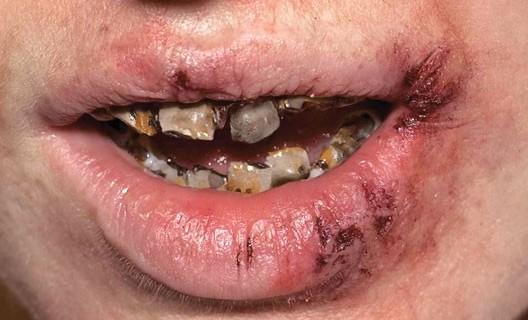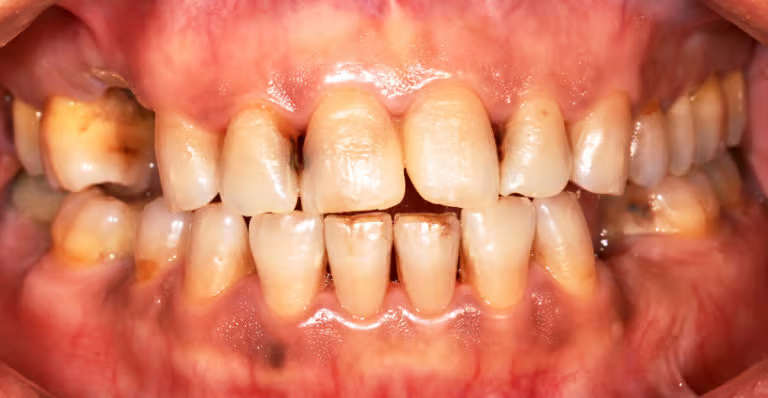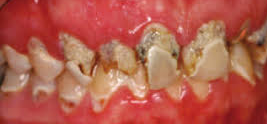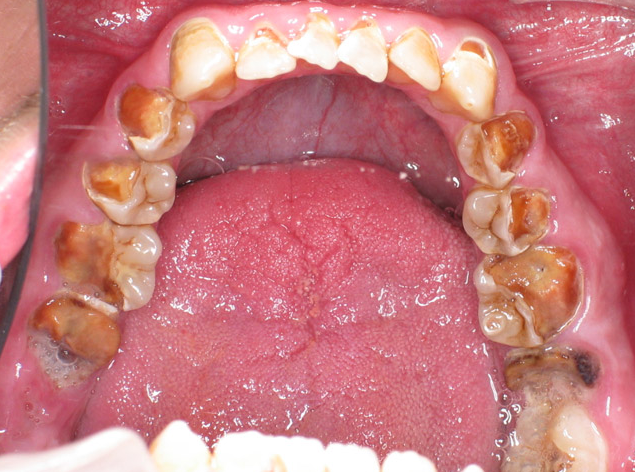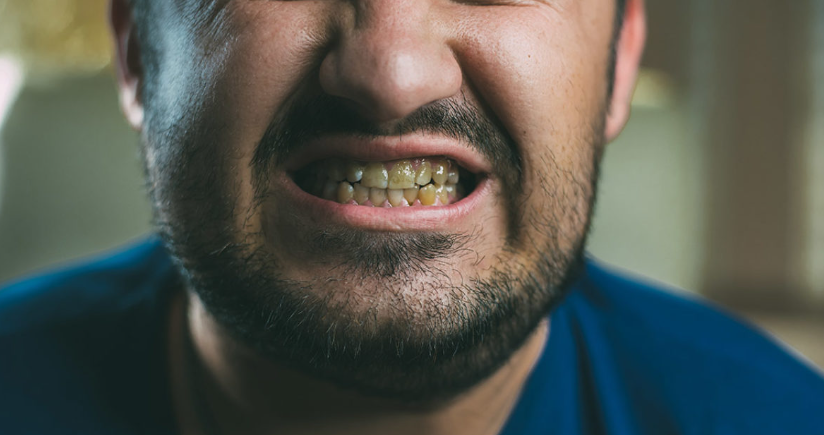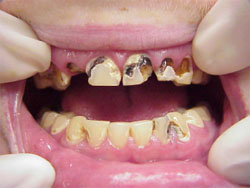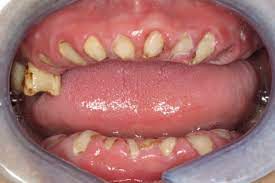Meth Teeth
Meth addiction can trigger a condition called meth teeth. Methamphetamine, also known as meth, is one of the most powerful and addictive illicit drugs in America. It doesn’t just cause psychological damage but can also lead to horrific physical changes. One of the most notorious side effects of methamphetamine abuse is meth teeth. Meth teeth is a condition that causes users to lose their teeth rapidly and leave behind an unhealthy mouth full of decay and destruction.
Meth Teeth Images
Meth Teeth Images are widely available online, showing what happens when someone abuses this dangerous drug. The pictures are often disturbing and graphic; rotting or missing teeth combined with discoloration and bruising are common features in Meth Teeth Photos. While these images may be difficult to look at, they serve as a stark reminder for why it is important to stay away from this powerful and dangerous drug.
Why does meth cause users to lose their teeth? Methamphetamine causes users to grind or clench their teeth, which can wear down enamel over time and lead to decay. The drug has an acidic composition that erodes tooth enamel even faster than regular grinding. Combining these two factors creates a perfect storm for tooth decay and deterioration in long-term methamphetamine users.
The horrific Meth picture serves as an urgent warning against meth use – no matter how powerful or attractive its short-term effects may be, methamphetamine has serious long-term consequences that cannot be ignored. With this in mind, it’s important to remember that you don’t have to be a meth user to experience the devastating effects of this drug. Just one look at Meth Teeth Pictures can be enough to make anyone think twice before making a decision they may regret later.
Meth Teeth Images and Pics Gallery
If you or someone you know is struggling with methamphetamine addiction, seek help immediately. Many rehabilitation programs and support networks can assist and guide in recovering from an addiction to this powerful drug. Remember – it’s never too late to get help! Stay safe and stay away from meth.
Why Does Meth Ruin Teeth? Meth Teeth Distruction.
Extreme gum disease and tooth decay are the hallmarks seen in Meth teeth images. Meth teeth pics frequently show teeth breaking or falling out. Of 571 methamphetamine users’ mouths were examined, and the results revealed:
- 96% had cavities
- 58% had untreated tooth decay
- 31% had six or more missing teeth
Methamphetamine addicts typical Meth teeth images show discolored, decaying, cracking teeth coming apart. Meth teeth must frequently be extracted since they cannot be saved. A combination of drug-induced psychological and physiological changes that promote a dry mouth and prolonged periods of poor dental hygiene are likely to blame for the widespread Meth teeth decay. The substance methamphetamine itself is acidic.
According to the study, a person’s teeth rot got worse the more meth they smoked. Gum disease and tooth decay were more prevalent in meth users who were smokers, women, or those who were 30 or older.
Is Meth Addictive?
Meth is a stimulant that can cause addiction after just one use and is highly addictive. The drug’s dopamine rush is mostly to blame for this. In addition to making us feel good, the neurotransmitter dopamine influences motivation, memory recall, learning, and reward processing.
Meth addicts continue to use the drug to sustain their euphoric and happy sentiments because the rush of dopamine it causes is substantially more than the quantity naturally produced in the brain.
Many Meth users use the substance over the course of many days, during which time they experience constant euphoria. This commonly causes tolerance to develop; after taking the drug repeatedly, a person will require ever-increasing doses to have the same effects as before. Addiction can emerge fast because of the chemical’s stimulating effects and low cost.
It can be challenging to stay upbeat when trying to stop using meth, and when that feeling wears off, withdrawal symptoms, including anxiety, insomnia, lethargy, and depression, may manifest. The devastating withdrawal symptoms encourage abusive conduct and raise the likelihood of bingeing. A person’s dread of withdrawal and meth cravings can take over their lives if their reward system becomes dependent on the drug.
Symptoms Of Meth Addiction
Due to its significant psychological and physical toll on the body, meth is one of the most lethal substances on the market. These symptoms and warning signs can be recognized in various ways since meth significantly impacts a user’s body and brain.
One of the first indications that someone is using meth is a sudden loss of interest in things that were formerly important to them. Meth use and pursuit will precede personal interests, interpersonal relationships, and career goals.
The more time someone spends using Meth, the more obvious it becomes. Many people may initially try to hide their drug usage. Because of the molecular alterations brought on by methamphetamine, what was once recreational drug use may now take precedence in one’s life.
Is Meth Physically Addictive?
Irrefutably, “yes” is the short answer to the question, “Is meth physiologically addictive?” The chemistry of the brain is affected by methamphetamine interaction. No matter how they take it, the drug always enters users’ bloodstreams.
The stimulant’s effects on the body’s central nervous system increase dopamine levels. The body and brain become hooked when the drug activates these “feel good” sensors, ultimately making users dependent on the drug for it to work as intended.
Meth addiction is easy to get and spreads quickly. But quitting drinking is much more challenging. The body will attempt to self-correct, but an abrupt halt will have harmful effects. This causes severe withdrawal symptoms to appear.
What Are The Signs Of A Meth Addiction?
Meth Addict Behavior: Meth abusers and addicts will show various behavioral and physical signs. Among the most typical meth symptoms are:
- Hyperactivity
- Twitching, facial tics, jerky movements
- Meth High Symptoms: Paranoia
- Dilated pupils
- Noticeable and sudden weight loss
- Skin sores
- Rapid eye movement
- Reduced appetite
- Agitation
- Burns, particularly on the lips or fingers
- Erratic sleeping patterns
- Rotting teeth
- Outbursts or mood swings
- Extreme weight loss
Another blatant indicator of meth usage is “tweaking,” a period of anxiety and insomnia that can last for three to fifteen days. When a meth user can no longer get the rush or high, tweaking occurs at the end of a drug binge.
Tweaking can have psychologically harmful outcomes like paranoia, irritability, and bewilderment due to the need to use it again. Furthermore, hallucinations and a penchant for violent behavior might result from meth-related tweaking.
Why Is Meth Addictive?
Another sign that someone is using meth is the crash phase. During this period, Meth stops feeding the body with dopamine, leaving the body incredibly exhausted. A crash is characterized by protracted periods of sleep, intense drug cravings, and depression and can last for one to three days.
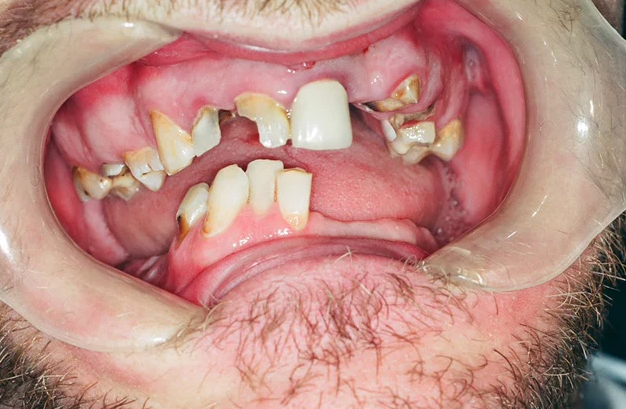
Skip To:
Learn More:
- Do Crystals For Depression Work?
- Depression and ADHD: What’s the Link?
- Autism and Depression Connection, Diagnosis & Treatment
- Signs of Depression in Men, Causes, & What to Know
- Rehab for Depression & Anxiety Treatment
- What is the Best SSRI for Anxiety?
- Social Anxiety Disorder
- Grounding Techniques for Anxiety Attacks
- Mental Health Poems that are Powerful and Healing
- Short-Term Disability Mental Health
Get Help. Get Better. Get Your Life Back.
Searching for Accredited Drug and Alcohol Rehab Centers Near You?
Even if you have failed previously and relapsed, or are in the middle of a difficult crisis, we stand ready to support you. Our trusted behavioral health specialists will not give up on you. When you feel ready or just want someone to speak to about therapy alternatives to change your life call us. Even if we cannot assist you, we will lead you to wherever you can get support. There is no obligation. Call our hotline today.
(844) 597-1011Methamphetamine Meth Teeth Factsheet
What is Methamphetamine?
Meth is a highly addictive stimulant that can cause addiction in as little as a single use. This is mainly due to the rush of dopamine produced by the drug. Dopamine is a chemical that’s not only responsible for inducing feelings of pleasure but also for motivation, memory retention, learning, and reward processing. The rush of dopamine produced by Meth is much higher than the natural amount of dopamine produced in the brain, which causes people to continue using the drug to keep those heightened and pleasurable feelings.
Methamphetamine Effects
Abuse of methamphetamine includes any illegal usage of the drug. When smoked or injected, meth causes a “rush” similar to that experienced when using crack cocaine; this is brought on by increased heart rate, blood pressure, and pleasure-inducing neurotransmitters in the brain. Snorting meth produces an ecstatic feeling but not a rush.
The infusion rush produces the biggest effects, which can last up to 30 minutes. Depending on the drug’s use, users enjoy a sustained high that can continue between 8 and 24 hours after the first surge. Meth injection delivers a higher high than smoking or snorting it, although it lasts less.
Street Names for Methamphetamine
Meth and Crystal Meth are chemically identical substances, despite the differences in the structural composition of the two varieties. Methamphetamine goes by the following street names:
- Glass
- Speed
- Ice
- Crystal
- Crank
- Tweak
- Redneck Cocaine
- Chalk
The vast bulk of meth sold today comes from imports and clandestine labs. A few people will often generate modest amounts of the material in “home labs” or “stove tops,” where the product is typically cooked. Meth is also made in cartel “super labs,” which use high-end machinery to generate the drug in greater quantities and with superior quality.
The stimulant Ephedrine or Pseudoephedrine, present in certain popular over-the-counter cough and cold treatments, is often the main component in meth. Meth labs are famously hazardous due to the toxic and flammable gases and chemicals generated during the production of the drug.
Methamphetamine Statistics
550 Million
Meth costs the United States $550 million in drug treatment programs annually.
Source: NIDA
16 Million
According to the 2017 National Survey on Drug Use and Health, 1.6 million people reported using Meth in the past year.
Source: NIDA
964.000 People
An estimated 964,000 people aged 12 and older qualify as having a Meth use disorder in 2017.
Source: NIDA
What Percentage Of Meth Addicts Recover?
The statistics on treating meth addiction are similar to those for treating all other addictions. The physical dependence on meth is eliminated during a week of detox, leaving the addict with the disease of addiction. Being a persistent, recurrent mental illness, meth has relapse rates equivalent to those of other chronic diseases like hypertension.
The recovery rate for meth is between 40 and 60 percent over the first year of therapy. Even while the meth recovery rate may seem low, it’s essential to understand that because the disease is chronic and relapsing, it may take several treatment attempts before the condition is ultimately under control, according to government groups like the National Institute on Drug Addiction.
What Does Meth Do To Your Teeth?
Does Meth Make Your Teeth Fall Out? Meth addiction causes major oral problems and poor dental health, which are referred to as “meth mouth” in many cases. A meth user’s oral health will rapidly deteriorate, starting with discoloration, followed by teeth that are rotting and decaying, severe gum disease, and eventually, losing all of their teeth. How Does Meth Ruin Teeth? According to the American Dental Association, meth mouth can cause:
- Dry mouth (xerostomia)
- Swollen or red gums
- Bleeding gums
- Dental discoloration and staining
- Chipped or cracked teeth
- Worn-down or hollowed-out teeth
- Tooth loss
Does Meth Rot Your Teeth? Meth mouth and other physical and mental health problems are traits of long-term meth addicts. The side effects of using meth more frequently and for longer durations will worsen.

Get Your Life Back
Find Hope & Recovery. Get Safe Comfortable Detox, Addiction Rehab & Dual Diagnosis High-Quality Care.
Hotline(844) 597-1011Why Does Meth Rot Your Teeth? Meth Teeth Images: Images Of Meth Mouth (Meth Addict Teeth)
How Does Meth Affect Teeth? You might be asking why meth has such negative effects on the mouth now that we’ve described what meth mouth is. These are the most typical explanations:
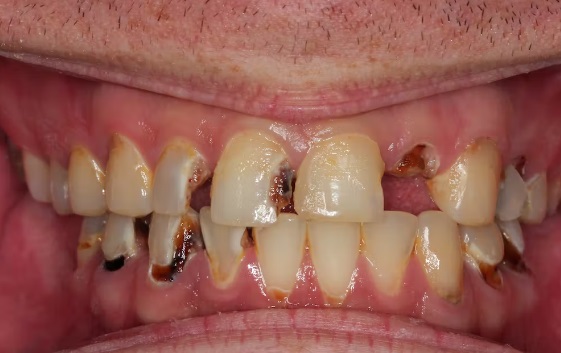
1. What Do Meth Teeth Look Like? Meth Slows Salivary Functions
What Does Meth Do To Teeth? Because methamphetamine is an acidic substance, it dries out of the mouth. Saliva is essential for maintaining oral balance and preventing acid from eroding tooth enamel. Long-term meth usage suppresses salivary glands, causing the mouth to become highly acidic and the teeth to decay.
2. What Does Meth Teeth Look Like? Meth Causes Sugar Cravings
Why Does Meth Make Your Teeth Fall Out? Meth mouth also includes a strong desire for sweet beverages. Meth addicts frequently experience unexpected weight loss since meth users typically have decreased appetites.
Why Does Meth Rot Teeth? Yet, meth addicts frequently only seek sugar-based calories. Merely consuming sugary foods and beverages causes tooth damage and cavities in addition to starvation. It’s the ideal environment for bacteria to grow when coupled with a dry mouth.
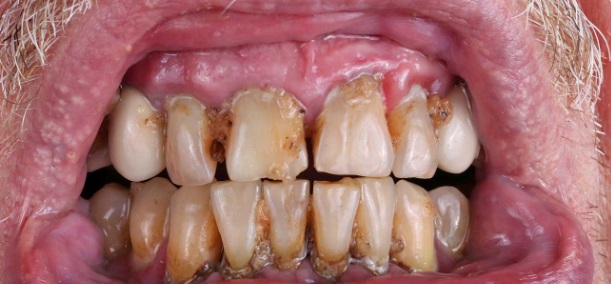
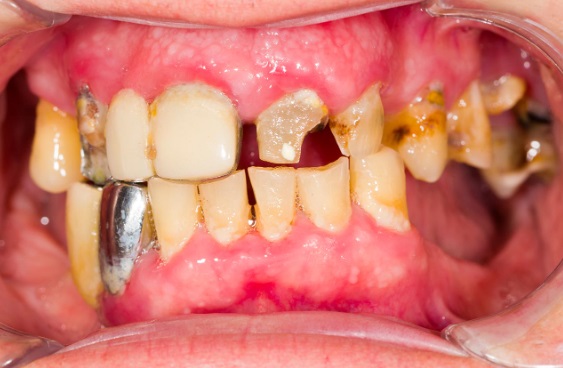
3. Why Does Meth Destroy Teeth? Lack of Oral Hygiene
Does Meth Ruin Your Teeth? Finding the next “high” is the concentration and attention of meth addicts. This, regrettably, means that other things that were once thought to be essential are no longer a priority.
Meth addicts frequently neglect their oral care for extended periods of time, which only accelerates the destruction of their teeth.
4. Why Does Meth Ruin Your Teeth? Teeth Grinding and Clenching
Why Do Meth Users Have Bad Teeth? The habit of clenching or grinding one’s teeth is another negative effect of meth use. Meth is a stimulant that speeds up metabolism and heart rate.
Why Does Meth Make You Lose Teeth? Meth addicts also experience hyperactivity as a result of this, frequently grinding their teeth unconsciously.
Why Does Meth Make You Lose Your Teeth? When weak teeth are subjected to additional strain, the teeth are more likely to fracture, break, and eventually fall off.
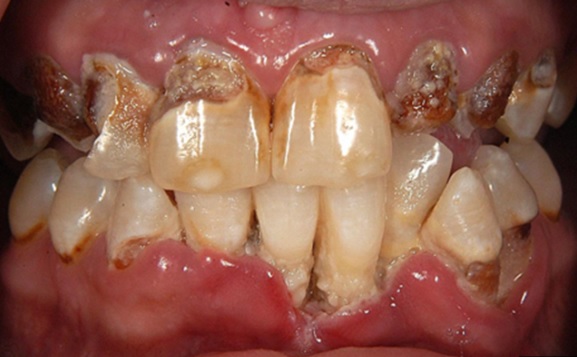
5. Why Does Meth Mess Up Your Teeth? Chemicals in Meth
How Does Meth Affect Your Teeth? Meth is formed of dangerous compounds that can erode your teeth’s enamel. Meth addicts’ teeth are already more vulnerable to damage, in addition to all the other negative consequences that meth use can have on the mouth. Without enamel, the teeth are more vulnerable to chemical damage and deteriorate more quickly.
High-Functioning Meth Addict
Because of their preconceived ideas about what addiction is, people struggle to understand what it’s like to be a productive meth addict. A meth addict who is still abusing the substance frequently can start the day by using it and continue to do so frequently all day.
Being a stimulant, meth increases a person’s vigilance and energy, allowing them to focus on their responsibilities even while they are high. Like many functioning addicts, a meth addict who is high functioning may have a solid educational background and a respectable job. They may be effective as well as able to work when under the influence of drugs. Functional meth addicts may be able to maintain a comfortable living and happy relationships with their loved ones in spite of their drug problems.
They would still go to their kids’ soccer games and engage in social events. They have frequent accountability instead of tense relationships or run-ins with the law.
Meth mouth, often known as poor oral health or tooth decay, is one of the most common signs of meth addiction. Although meth mouth is usually referenced in relation to methamphetamine addiction, this type of functioning addict may not necessarily have it. Addicts to methamphetamine who have great levels of care may also maintain excellent oral hygiene. This may make it difficult to identify their drug use.
There is no doubt that functional addiction exists, yet even a high-functioning addict will experience some side effects from continued meth use. Drug use temporarily allows them to function and maintain a certain façade. Another consequence of being a high-functioning addict is the conviction that one is essentially immune to or an exception to the dangers of addiction. This is absolutely not true. Like with other narcotics, continued drug abuse can eventually result in dangerous and life-threatening problems.
First-class Facilities & Amenities
World-class High-Quality Addiction & Mental Health Rehabilitation Treatment
Rehab Centers TourRenowned Addiction Centers. Serene Private Facilities. Inpatient rehab programs vary.
Addiction Helpline(844) 597-1011Proven recovery success experience, backed by a Team w/ History of:
15+
Years of Unified Experience
100s
5-Star Reviews Across Our Centers
10K
Recovery Success Stories Across Our Network
- Low Patient to Therapist Ratio
- Onsite Medical Detox Center
- Comprehensive Dual-Diagnosis Treatment
- Complimentary Family & Alumni Programs
- Coaching, Recovery & Personal Development Events
Meth Teeth Treatment
Meth Teeth: It’s frequently too late to undo the harm when meth mouth oral symptoms start to appear. Dentists cannot reverse or cure the degree of teeth degeneration and corrosion present in meth addicts. Nonetheless, to enhance their smiles and confidence, recovering addicts frequently decide to undergo cosmetic dental procedures.
Meth Teeth: After attempting to save any teeth that may still be healthy, dentists can pull any remaining teeth that are deteriorating or deteriorated beyond the point of saving. Some people can restore their teeth with just a few crowns, dental implants, or porcelain veneers. But, after having all of their teeth extracted, other addicts in recovery will require full dentures. Getting aid to stop using meth is the most important thing meth users can do to enhance their oral health and general wellbeing.
Meth Addiction Treatment
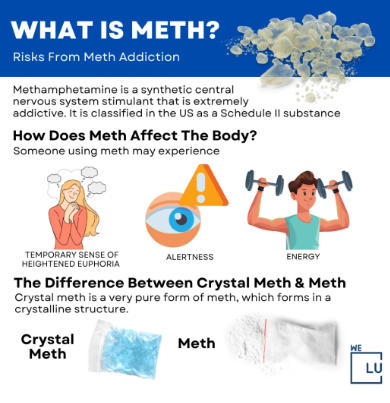
Meth withdrawal management is taking the drug out of the patient’s system as a team of medical professionals helps the patient manage their withdrawal symptoms. The management of meth withdrawal also referred to as detox, is frequently part of the first step of a treatment program for substance use disorders (SUD).
After detoxification, the majority of patients will benefit from additional care, such as inpatient or outpatient rehab. Patients will receive support in choosing the optimal program to address the behavioral and social aspects of their addiction after finishing a medically assisted detox program (as well as other pertinent needs).
Medically assisted detox for meth withdrawal may have the following advantages:
- Risk assessment for medical and mental health issues. Medical supervision can help someone stay safe because meth withdrawal might cause extreme depression or suicidal thoughts.
- Supplying framework and assistance. This can aid in a person’s recovery and help them become ready for additional therapy.
- Removing a user of meth from their environment. This can lessen cravings brought on by environmental cues that might trigger a relapse.
- As necessary, offering dietary assistance. Someone who is battling with meth addiction may need support, such as larger or high-calorie meals, electrolyte supplements, or contact with a food professional. Meth consumption has been linked to weight loss and inadequate nutrition.
As was already said, after completing detox, patients may enroll in inpatient rehabilitation or outpatient therapy. Several behavioral therapies used in professional treatment can offer a number of advantages, including:
- Helping a patient learn ways to prevent relapse.
- Teaching a patient healthier coping and stress management skills.
- Helping a patient uncover and work through the underlying reasons they developed an addiction in the first place.
Inpatient rehab offers the additional benefit of round-the-clock supervision and assistance to help patients be safe and take care of any co-occurring problems that may develop. If a person has co-occurring psychiatric disorders or life-threatening medical issues, this additional help may be very important.
A person who is addicted to methamphetamine may benefit from the following behavioral therapies:
- Cognitive-behavioral therapy (CBT). This aids patients in recognizing negative or unhealthy attitudes and behaviors that fuel their substance usage and helping them modify them. According to some studies, CBT and contingency management are particularly effective in treating amphetamine addiction.
- Contingency management (CM). When someone demonstrates a desired behavior (like passing a drug test), it offers concrete rewards; however, if the desired behavior is not demonstrated, the reward is withheld.
Making ensuring a patient gets enough food and exercise during detox and throughout all phases of treatment is crucial for keeping them healthy as they recover.
Can You Die From Meth Withdrawal?
It’s important to keep in mind that while meth withdrawal might be challenging and uncomfortable, it is not a life-threatening condition. Fatigue, anxiety, and depression are among the symptoms of meth withdrawal that are most common. Even while these symptoms may be unpleasant, they are not harmful.
You can get through meth withdrawal and start down the road to recovery with the right help and direction. Please get professional treatment if you or someone you know is battling meth addiction. There is no shame in requesting assistance. Recall that meth addiction is a serious illness that necessitates medical attention.
Medication For Meth Addiction
Meth withdrawal (Meth Withdraws) can neither be treated with drugs nor can stimulant use disorder be treated with drugs that have FDA approval. If a person undergoes medically supervised detox, they could be given additional medications to treat some of the withdrawal symptoms they might experience, such as headaches or insomnia.
How To Help A Meth Addict? How To Help Meth Addicts?
You must strike a balance between acknowledging their plight and urging them to get assistance if you want the greatest outcomes. Consider these actions to assist your loved one as a guide for your procedure.
- Learn about the condition
- Decide if you will address your loved one’s addiction
- Start the conversation
- Make yourself a priority
World-class, Accredited, 5-Star Reviewed, Effective Addiction & Mental Health Programs. Complete Behavioral Health Inpatient Rehab, Detox plus Co-occuring Disorders Therapy.
CALL(844) 597-1011End the Addiction Pain. End the Emotional Rollercoaster. Get Your Life Back. Start Drug, Alcohol & Dual Diagnosis Mental Health Treatment Now. Get Free No-obligation Guidance by Substance Abuse Specialists Who Understand Addiction & Mental Health Recovery & Know How to Help.
We Level Up Dual Diagnosis Treatment
The definition of dual diagnosis (also referred to as co-occurring disorders) can differ between institutions. However, it is generally described as the specific treatment of someone who has been diagnosed with a substance use disorder and a mental health disorder at the same time. Treating dual-diagnosis clients is a critical aspect of our inpatient treatment experience because co-occurring disorders are strongly correlated with instances of substance abuse.
Creating a treatment plan that addresses the physical aspects of withdrawal, the psychological connection with drug use, and managing underlying mental health disorders is part of setting clients up for success. A thorough mental health analysis identifies possibilities for treatment. Meeting with mental health counselors and medical care providers means access to behavioral therapy and medication treatment. At our dual diagnosis treatment center, We Level Up can implement the highest quality of care.
We recognize the fragile complexities of how mental and substance abuse disorders can influence others and sometimes result in a vicious cycle of addiction. That’s why we offer specialized treatment in dual-diagnosis cases to provide the most excellent chance of true healing and long-lasting recovery.
It can be challenging to accept that you may be living with a mental illness, but once it is properly diagnosed and treated, treating the presenting case of substance abuse can be magnitudes easier. Only a properly trained medical professional can diagnose these underlying conditions. If you believe you are suffering from a disorder alongside addiction, we urge you to seek a qualified treatment center to begin your journey to recovery. Call We Level Up today.
Experience Transformative Recovery at We Level Up Treatment Centers.
See our authentic success stories. Get inspired. Get the help you deserve.
Start a New Life
Begin with a free call to an addiction & behavioral health treatment advisor. Learn more about our dual-diagnosis programs. The We Level Up Treatment Center Network delivers recovery programs that vary by each treatment facility. Call to learn more.
- Personalized Care
- Caring Accountable Staff
- World-class Amenities
- Licensed & Accredited
- Renowned w/ 100s 5-Star Reviews
We’ll Call You
Search We Level Up Meth Teeth Resources
Sources
[1] National Institute of Mental Health – ‘Depression’ (www.nimh.nih.gov)
[2] U.S. Food and Drug Administration (FDA) (www.fda.gov/)
[3] Depression Treatment » Drug Alcohol Addiction Rehab
[5] NIMH – https://www.nimh.nih.gov/health/publications/social-anxiety-disorder-more-than-just-shyness
[6] Selective Serotonin Reuptake Inhibitors – National Center for Biotechnology Information, U.S. National Library of Medicine
[7] ‘Anxiety Disorders’ – National Institute Of Mental Health (Nimh.nih.gov)
[8] Psychopharmacology of anxiety disorders – National Center for Biotechnology Information, U.S. National Library of Medicine
[9] Products – Data Briefs – Number 379 – September 2020 (cdc.gov) Depression – National Institute of Mental Health
[10] Coping with Stress – Centers for Disease Control and Prevention
